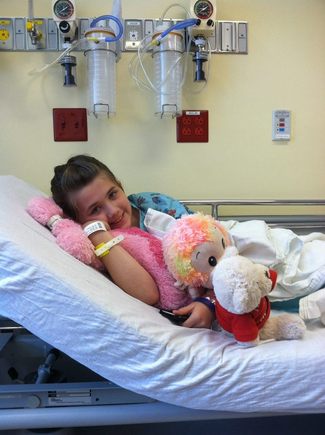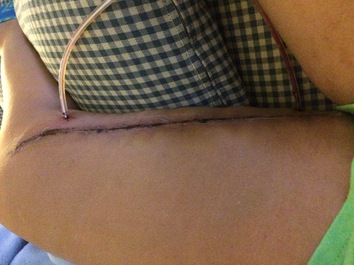December 1 marks the start of Crohn's and Colitis Awareness Week, an important week within the inflammatory bowel disease (IBD) community to bring attention to Crohn's disease and ulcerative colitis (UC), two debilitating digestive diseases that cause crippling abdominal pain, persistent diarrhea, rectal bleeding, and weight loss.
More than 1.4 million Americans live with these diseases, yet most people are unfamiliar with them, thinking that IBD and irritable bowel syndrome are synonymous, or downplaying the symptoms.
"One of the most challenging things is that every patient's disease is different," says Rick Geswell, president and CEO of the Crohn's & Colitis Foundation of America. "We know that what works for one patient, may not work for another. And it's so unpredictable. Some patients are so sick that they can't even leave their homes. Others may have mild disease for most of their life and then all of sudden they flare and land in the hospital. That's why it's so important for all patients to rally together -- especially during awareness week."
As Geswell says, it's hard to grasp the reality of living with these diseases. So in order to explain what it's like have an inflammatory bowel disease, I asked several patients to share their experiences.
Kelly, 30, indeterminate colitis
I was diagnosed with UC when I was 15. After years of minor flares and periods of remission, things turned for the worse in 2011. A year later, surgery became my only option. In May 2012, I had five feet of large intestine removed and an ileostomy. I was also diagnosed with indeterminate colitis because I exhibited symptoms of both Crohn's and UC.
In August 2013, I had surgery to remove the rest of my large intestine, rectum, and anus, making my ileostomy permanent. During the following 15 months, I battled serious drainage issues and severe pain in my rectal area. I had five minor procedures but none solved the problem. Two weeks ago, I had a muscle flap and rectal reconstruction surgery to try and heal my rectum. I'm relearning how to walk with my left leg because that's where the muscle was taken for the procedure.
Having IBD has made me a stronger person. I believe that I can take on anything and I'll get through it, no matter what.
Ally, 24, Crohn's disease
When I was 11, after months of abdominal pain, urgency, and fatigue, I was diagnosed with Crohn's disease -- an illness that my family and I had never heard of before.
At the end of my freshman year, I had emergency surgery due to a perforated colon, resulting in a gallon of waste poisoning my organs. After eight months with a colostomy, I had surgery to reverse it. Complications from that surgery caused me to have two blood infections, an intestinal infection, and an inflamed liver. A year later, I had another surgery to remove scar tissue, and have been in remission since.
Having Crohn's disease means that I have experienced the pain, but also the good, the successes, the opportunities, and the achievements associated with IBD. Helping pass the Restroom Access Act in Illinois and elsewhere is one example of this.
Having IBD means seeing the bigger picture while continuing to appreciate the small gifts. Having IBD means living beyond the illness and not allowing it to define who I am but, instead, being part of a story in which I have come to know what I want to do with my life: secure civil rights and protections for people with chronic medical conditions and disabilities.
Piper, 10, Crohn's disease (as told by her mom)
After developing an abscess when she was 8, Piper became septic, had surgery and was subsequently diagnosed with Crohn's disease. We tried to manage her disease through various medications, but they have failed. She has not been able to get off of steroids without going into a flare. Piper is currently on Entyvio, the newest medication approved to treat Crohn's and UC, and will be starting a restricted diet. 
Having Crohn's disease means she has to watch what she eats. She can tolerate something one day, and not the next. Piper says she "Doesn't look forward to eating, because Crohn's has taken the fun out of it."
Brian, 32, Crohn's disease
When I was 11, I started having stomach pain and was diagnosed with Crohn's disease. Since being diagnosed, I have had 36 surgeries, including an ileostomy. This past summer, I had a proctectomy to remove my rectum.
To me, having IBD is about adversity and learning how to make the most of a bad situation. Social situations can become anxiety-filled and activities can become overwhelming. Swallowing pills, injecting medicine, regular hospital visits and surgery have become part of my life. It can be excruciatingly hard, but we don't have a choice other than to battle back.
Sarah, 30, ulcerative colitis
After suffering from bouts of urgency, bloody stool, and pain, I was diagnosed with UC at 15 years old. My doctors tried everything to treat me, but nothing worked. Surgery was my only option and my colectomy was performed in between semesters of my senior year of college.
IBD is a part of who I am. I am a person with a disease, not a diseased person and I will never let being sick stand in the way of my success.
Ryan, 41, Crohn's disease
I was diagnosed with Crohn's disease in 2009 and tried nearly every medication to manage my symptoms. In 2011, I had my colon removed. My story doesn't end there though. Just last week, a colonoscopy showed ulcerations and inflammation in my remaining intestines and two long, deep lacerations, which pose a threat of perforation.
Having IBD means to me that I live my life mostly in fear. However, I won't let that fear stop me from living.
Instead, I work to raise awareness of these diseases, including raising money for research by attempting to swim 24 miles across Lake Erie. I've attempted this twice and while I haven't completed the full swim, I will continue to do so until a cure is found for IBD.
Crohn's and Colitis Awareness Week runs from December 1-7, 2013. Help raise awareness by posting photos of your IBD on Facebook and Twitter using #IBDselfie, #BeyondTheBathroom, and #GetYourBellyOut.

